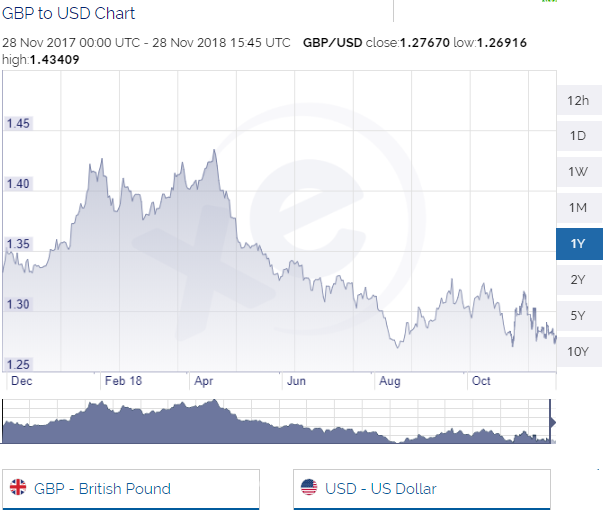
In Conversation: Protecting your Bottom Line from the Impact of Currency Fluctuation
November 20, 2018 — 5 min read
Welcome to In Conversation, foreign exchange insights and discussions from to support businesses that send or receive international payments.
Foreign exchange markets become more and more liquid over the years as global trade increases, with a daily volume of US $5.3 trillion.Increased international trade presents exciting opportunities for both large and small companies across a wide range of industries. But, as the last year has demonstrated, foreign exchange exposure can also present a risk to companies and investors, if the rate moves against them.
Political and economic events both in the UK and overseas have the potential to cause exchange rate fluctuations, which can either eat into a company’s profit margin or force them to increase their prices and potentially become less competitive. We’ve looked at events which are a potential concern for businesses with foreign exchange exposure. Here are options which could help them manage this risk.
**Domestic events**
Brexit has, of course, been the primary factor affecting the value of Sterling in the last year. On the day the results were announced, the Pound dropped 12% against the Dollar and it has continued to fluctuate in the following months. From a high of 1.49 shortly before the vote, it dropped as low as 1.20 in January of 2017, although it has since picked up again slightly since then, and has been fluctuating around 1.27:

View GBP to USD exchange rates on XE.com
If a UK business needed to pay an invoice to a supplier in Dollars when the Pound was at its lowest point in January, they may have ended up paying almost 20% more than they would have done seven months earlier.
On the other hand, the UK economy has so far remained reasonably resilient, which has helped to provide a boost to the Pound on a number of occasions. For example, the Bank of England’s latest announcement on interest rates was more positive than had been expected, which boosted the Pound against the Euro and the Dollar. So a business making a payment shortly after this news was announced would have got a bit more for their money.
**Overseas events**
It is worth remembering that exchange rates are a ratio between two currencies. So if something happens overseas to weaken a country’s currency, the Pound can strengthen as a result. For example, there have been some fluctuations in the Dollar as a result of Donald Trump’s actions since he became President in January, and again following a less positive than expected message in a public announcements about the US Federal Reserve Bank about interest rate hikes.
Meanwhile in Europe, the Pound experienced a boost against the Euro in the run-up to the recent elections in the Netherlands, where there were concerns that far-right candidate Geert Wilders could gain ground. There could be a similar effect around the French elections in April and May, and then the German elections in September.
**What does this mean for my business?**
If your business sends or receives international payments, currency moves can potentially have a detrimental impact on your bottom line. But there are ways you can look to protect your business from adverse moves.
The first step is to understand your exposure and the potential risks to your business. Once you have an understanding of your risks, develop (or review) your company’s FX policy to ensure you have a plan in place, whatever happens next. Then you can start to take a look at the various products on offer that could help you to mitigate your risk – these include forward contracts, FX options and FX structured products. These products have all been designed to help companies hedge their risk in different situations.
We’ll be taking a look at this in more detail in our CIMA Bitesize Briefing sessions, including:
Risk identification
Quantification of the risk elements
FX strategy and implementation
Execution of spot, forward and FX options and FX structured Products
Pro and cons of different hedging tools with scenario analysis
Market timing
If you’d like to discuss your business’ situation in more detail, please call our XE Money Transfers corporate transactions team.
The information, materials, accompanying literature and documentation available on our internet site is for information purposes only and is not intended as a solicitation for funds or a recommendation to trade. Xe, its officers, employees and representatives accept no liability whatsoever for any loss or damages suffered through any act or omission taken as a result of reading or interpreting any of the above information.
While we take reasonable care to keep the information on the website accurate and up to date, there may be occasions when this is not possible. Case Studies and articles are not intended to predict future moves in exchange rates or constitute advice.
Xe makes no representations, warranties, or assurances as to the accuracy or completeness of any information derived from third party sources. If you are in any doubt as to the suitability of any foreign exchange product that you are intending to purchase from Xe, we recommend that you seek independent financial advice first.
For more information about XE, please click here: Regulatory Information
Related Posts

July 16, 2025 — 4 min read

July 16, 2025 — 5 min read

July 14, 2025 — 6 min read

June 19, 2025 — 6 min read

May 1, 2025 — 5 min read

April 15, 2025 — 6 min read